Willow was released 25 years ago and comes this year with a completely restored Blu-ray version. One of the main advantages of this rejuvenation is the quality of the sound mixing in DTS HD, which gives even more size, energy and accuracy to the music. It literally fills the sound space and helps create an epic dimension for the adventures of Willow Ufgood, Elora Danan and Madmartigan.
"I am a musicologist, a doctor of music. Therefore I listened to, studied and analysed a lot of music. I also enjoy metaphors, the art of quoting and of cycles. The harmonic draft of the Willow score, and most particularly its spiritual side, came from such a cycle, from such mythology and music history that I was taught, and that I myself convey with my own emotions and compositions."
Over 25 years, many things have already been said regarding the music of such a heroic fantasy reference, which itself became a classic in film music. To write on this score and to propose new elements of analysis may be likened to a real challenge, despite the rich discourse the composer developed in his music. The many references to classical pieces he used were often at the core of talks, but without ever delivering an in-depth analysis of their meaning. Here is the challenge of our article: to dig down to the origins of the references, to examine the stories and the myths around them so as to better apprehend the art of quoting and of the cycle that James Horner is so keen on.
A magic trick
To tackle a heroic-fantasy story demands from the reader/audience, the acceptance of the wonderful and the supernatural. Entering the imaginary world of Willow is aided by a mysterious children’s choir, which instantly defines the fairytale and magical setting. James Horner quotes three notes from Leos Janacek's Glagolitic Mass, a work composed in 1926 for orchestra, organ, choir and vocal soloists, and naturally integrates it into his language. In the fourth part of the sacred work –or even the fifth one in the original version- called Veruju (Credo), a choir indeed sings the three same notes of an old Slavic liturgy: Ver-ru-ju.
Veruju, veruju v jedinogo Boga,
(I believe, I believe in one God,)
(I believe, I believe in one God,)
James Horner absolves himself of any criticism by naturally integrating these evocating notes in his language and by transposing them in George Lucas' imagination. The quote could  be easy, yet it transcends the picture. The adaptation could be artificial, but it is subtle and gives the musical legacy its full meaning. His quoting is precisely about meaning as it is always intended, and is the result of a creative purpose. Such methods may be questioned but its appropriateness cannot be denied.
be easy, yet it transcends the picture. The adaptation could be artificial, but it is subtle and gives the musical legacy its full meaning. His quoting is precisely about meaning as it is always intended, and is the result of a creative purpose. Such methods may be questioned but its appropriateness cannot be denied.
The idea of belief is highlighted through this reference and remains at the heart of the story. The King's College Choir of Wimbledon helps us believe in such an imaginary world and indeed feel its magic. It invites our minds to be immersed into the story that we are about to be told. They translate the faith and prophecy that make the newborn (Elora Danan) the chosen one of the Good, giving a biblical dimension to the narration. Appropriateness and accuracy. This heavenly choir reflects the life arising in the darkest jails of the fortress, where the evil Bavmorda reigns. It symbolizes the light that restores hope, hence its appearance when the midwife crosses the doorstep to the open day, carrying the baby in her arms. A brief and bright passage within this dark opening sequence.
This choir remarkably returns at the end, when Willow manages to return Fin Raziel, the wizard, to human form. By ending this curse that had transformed her into a rat, Willow becomes a genuine sorcerer and resolves the uncertainties that had affected his abilities. The music illustrates the wonder of such success, the belief leading to self-fulfillment.
By quoting this belief song of Leos Janacek, James Horner gives us all reasons to believe in the film's fairy, in Elora Danan's destiny, and in Willow's magician talents. In the final bars of the score, its last apparition ends the window on this imaginary world.
 be easy, yet it transcends the picture. The adaptation could be artificial, but it is subtle and gives the musical legacy its full meaning. His quoting is precisely about meaning as it is always intended, and is the result of a creative purpose. Such methods may be questioned but its appropriateness cannot be denied.
be easy, yet it transcends the picture. The adaptation could be artificial, but it is subtle and gives the musical legacy its full meaning. His quoting is precisely about meaning as it is always intended, and is the result of a creative purpose. Such methods may be questioned but its appropriateness cannot be denied.The idea of belief is highlighted through this reference and remains at the heart of the story. The King's College Choir of Wimbledon helps us believe in such an imaginary world and indeed feel its magic. It invites our minds to be immersed into the story that we are about to be told. They translate the faith and prophecy that make the newborn (Elora Danan) the chosen one of the Good, giving a biblical dimension to the narration. Appropriateness and accuracy. This heavenly choir reflects the life arising in the darkest jails of the fortress, where the evil Bavmorda reigns. It symbolizes the light that restores hope, hence its appearance when the midwife crosses the doorstep to the open day, carrying the baby in her arms. A brief and bright passage within this dark opening sequence.
This choir remarkably returns at the end, when Willow manages to return Fin Raziel, the wizard, to human form. By ending this curse that had transformed her into a rat, Willow becomes a genuine sorcerer and resolves the uncertainties that had affected his abilities. The music illustrates the wonder of such success, the belief leading to self-fulfillment.
By quoting this belief song of Leos Janacek, James Horner gives us all reasons to believe in the film's fairy, in Elora Danan's destiny, and in Willow's magician talents. In the final bars of the score, its last apparition ends the window on this imaginary world.
Light of Darkness
The most significant quote in the Elora Danan cue remains nonetheless that of Mozart's Requiem. James Horner uses the second part of Confutatis, this magic moment where both male and female voices sing together after the voca me cum benedictus, and which divinely expresses renunciation before dying, the abandonment of the body and rise of the spirit. In the introduction of Willow, the composer is somewhat the spokesman of the death, as he replaces the Latin song with strings. Now is not the time for recollection but for fate. The gravity of the music is, moreover emphasized by the percussion to evoke the rhythm of a heart in distress, and to reflect the underlying brutality of the scene.
Oro supplex et acclinis,
(Pleading and prostrated)
Cor contritum quasi cinis:
(I beg you, the heart broken and reduced to ashes)
Gere curam mei finis.
(take care of my last hour)
Prayer and penitence are a whole part of both works and of the film's pictures. The quote starts as imprisoned pregnant women are praying that the newborn child is the one of the prophecy, and that they are then released (0:49). The quote then continues as the prostrate mother begs the midwife Ethna to save her child, while being left alone to a certain death, fate giving way to sacrifice.
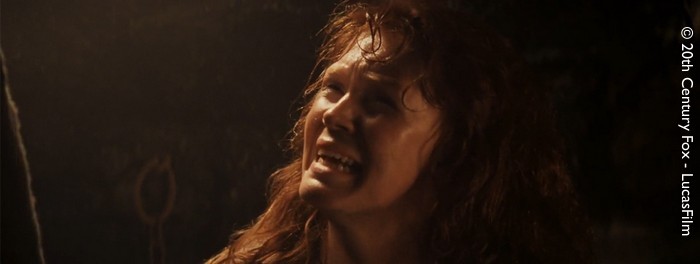
A summit in musical history, this Mozart piece is a contrast between the light and dark forces, hence its obvious return in the final confrontation between Fin Raziel and Bavmorda. James Horner's inspiration is, this time, the whirling and sharp beginning of the Confutatis, a genuine hypotyposis of Hell in the flames of which doomed and fallen spirits struggle. The reprise of this infernal extenuation in Willow is there again, deprived from the choir part and transfigured by dark pulses. It starts when the evil queen dominates Fin Raziel. Willow then faces Bavmorda in a very critical situation. The music encapsulates the feeling of both vulnerability and purity in front of the Evil forces.
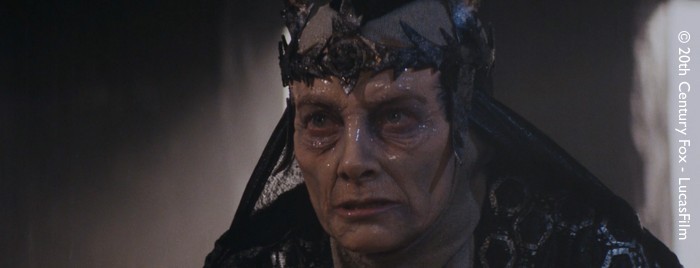
"For Willow The Sorcerer, my musicological discourse is again based upon opposition and what it represents: prophecy vs. darkness. Should the picture have given me the opportunity, I would have willingly integrated the chorale section that sings Confutatis Maledictus to emphasize on this notion of duel."
A hymn of hope
On to the beautiful theme appearing at the same time as the title, on screen (Elora Danan at 2:25). Embellished by Tony Hinnigan's flute, this melody evokes the moving delicacy of the baby and the great affection the adoptive mother holds to her. James Horner quotes a Bulgarian peasant song, Mir Stranke Le, coming from the Thrace region.
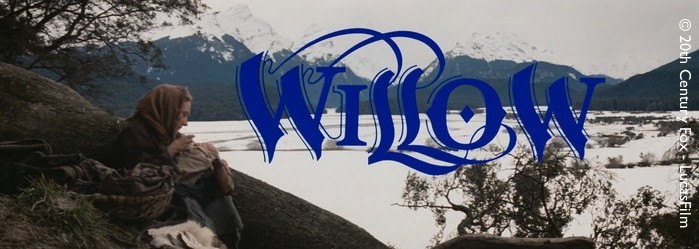
There are four logical reasons for this quote:
1) Popular and folkloric music has always influenced classical music a great deal, and notably that of the second half of the 19th century to the middle of the 20th. However, this is from the baroque music period that popular dances were reinvented through "academic" music. Over the 18th century, numerous composers, such as Joseph Haydn, already transposed country themes. Composers then worked to create music with a strong feeling of patriotism and therefore looked towards the folklore of their countries, which then became a source for Dvorak, Janacek, Bartok and others. If the latter researches specifically further by studying thousands of traditional melodies, all these composers made it possible to disseminate the beauty and richness of the folkloric repertoire from Central Europe, in a more imaginative, accessible and personal language. James Horner then continues a practice deeply rooted in the creative process of academic music, respecting the following precept: the science of music only aspires to simplicity by transcending evocations and emotions.
2) The heartbreaking melody of Mir Stranke Le might have found favor with James Horner for its emotional finesse and its origins close to him. The song is featured for the first time on the 1975 album Le Mystère Des Voix Bulgares (The Mystery of Bulgarian Voices), published by Marc Cellier. If it reached our western ears, this would be because of this man and his wife who explored the communist capital cities and provinces from the Black Sea to the Baltic Sea over forty years from 1950, gleaning, recording and meticulously inventorying popular pieces of music, these essential parts of daily life. The film Balkan Melodie charts their numerous excursions on the other side of the Iron Curtain. Considering James Horner's family background – his father was born in what is now the Czech Republic – and the influence of soviet composers' musical science on his writing, it is quite logical to find in Willow, a melody deeply rooted in Eastern Europe's traditions.

3) The Mir Stranke Le song comes from Thrace, a region of the Balkan Peninsula divided between Bulgaria, Greece and Turkey. Inhabited since prehistory, this region was the center of many conflicts between people during antiquity and the middle-ages. Heroes of mythology, Orpheus, son of Eagre, king of Thrace, and Spartacus used to live there. This is a history-filled country, which remarkably echoes the sources used by George Lucas to create the story of Willow: tales, legends and mythology.
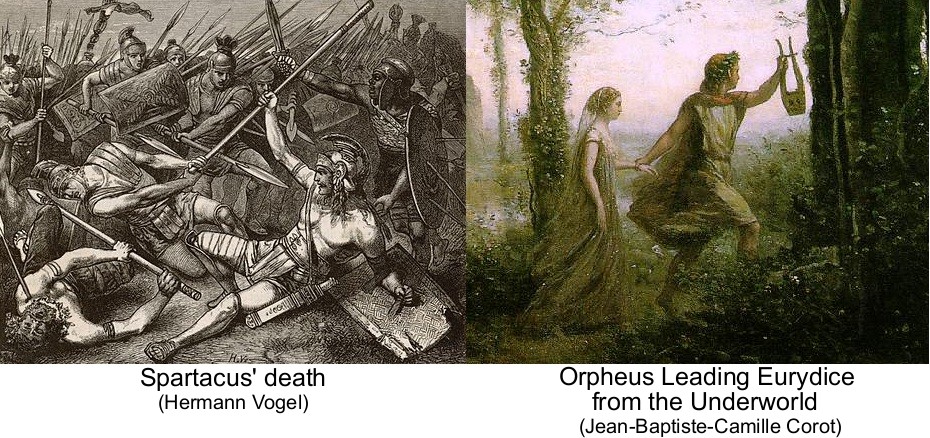
4) The lyrics to the song speak about separation:
Something happened in the mountains, and two shepherds were buried, two shepherds who were friends. One prays, let me go, my first love is waiting for me. The other prays, let me go, my old mother is waiting for me. The mountain opens up and keeps the two shepherds. The beloved girl mourns for a little while, while the mother mourns waiting until the grave.
This song implies that the love of a mother continues beyond death, and the quote is thus accompanied with a strong and painful message. Its listen is even more moving as the melody appears just after the death sentence is spoken by Bavmorda against Elora's mother. Despite sorrow, love lasts and life goes on. The sacrifice of the midwife and Willow's devotion to this love are the best examples of it.
A sylvan rebirth
To close the chapter of the cue Elora Danan, which is definitely rich in meaning and highly instructive, let us have a closer look at the melody showing up at 5:13 and which accompanies the slow drift of the little girl on a makeshift raft down the river after Ethna's demise, devoured by hunting dogs. Here, James Horner quotes the Cantata Profana subtitled The Nine Splendid Stags from Hungarian composer Béla Bartòk. Composed in 1930 for tenor, baryton, choir and orchestra, this work is about a hunter who lost his nine sons transformed into stags having new lives in the forest. The passage quoted by James Horner is the last bars of the work, at the end of the third movement (There was once an old man). The choir sings:
"Now their mouths no longer drink from crystal glasses, only cooling mountain springs; from clear and cooling mountain springs."
The subtle quote indicates that just like Bartok's stags, the child shall begin a new life in the middle of the forest. By mentioning the cooling mountain springs, the text refers to the little Elora slowly drifting down the river. In order to respect the role of conclusion of Bartok's melody, James Horner places it at the end of the child's journey on the river and at the end of the last cue (Willow the Sorcerer at 10:42). This is a clever way to end Willow's journey, a little man transformed by the great adventure he has gone through. James Horner will even quote this melody in Black Gold, to conclude the key scenes of Auda's evolution.
A heroic symphony
Regarding the theme of the brave Madmartigan played by Val Kilmer, anyone will know that James Horner was inspired by the first movement of Schuman's third symphony. Partly inspired by the great view of the cathedral of Cologne by the Rhine – one of the busiest waterways in the world – this symphony called, Rhenan, opens on a vivace first movement, which does not have any slow introduction, unlike the composer's other symphonies. This energy corresponds very well to Madmartigan, who shines all through the movie with his spontaneous, frank and impulsive actions of bravery. Besides, according to A. Peter Brown (in The symphonic repertoire: the European symphony from ca. 1800 to ca. 1930 – Great Britain, Russia and France), Robert Schumann used Beethoven's Third Symphony (the Heroic) as a writing model. This is another example to associate it to the characters' bravery.
"George Lucas wanted a concise theme that was spontaneous and lyrical, which is Schumann's own definition of the Rhine's mythology. Diverting a typical 19th Century German harmony, combining heroism and spirituality, and transposing them into a heroic-fantasy context was for me the ideal accompaniment for the adventures of these little characters."
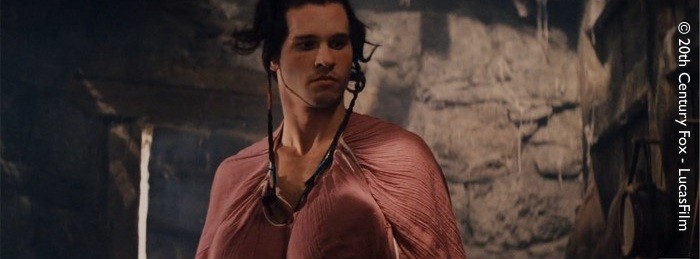
James Horner does not merely copy and paste. He brings a new breath, adds a particular color whenever the theme appears, and adds his own sensibility while respecting the historical and spiritual dimensions of the original work. The introduction of Schumann's theme is therefore transformed in four notes repeated twice, an antithesis of those associated to General Kael and to evil forces. The composer then disguises the whole with an impetuous overflow of beethovian malice and power worthy of the triumphant Allegro of the 5th Symphony, thus creating a new heroic, vigorous and lively theme, one of a few in film music.
Journey of initiation
At 1:45 in Willow's Journey Begins, James Horner quotes the Arabian Dance composed in 1874 by Edvard Grieg for the theater play Peer Gynt. Based on a dramatic and philosophical poem, the play narrates the adventures and journeys of Peer Gynt, a young Norwegian seeking fortune and love. The charming Arabian Dance evokes the character's trips in Morocco in act IV. The idea of a voyage is used by James Horner as he puts his variation of the Arabian Dance, when Willow and his friends start an expedition with the aim of bringing Elora back to the country of the Daikinis. Once again, this is a meaningful quote, as it is moreover not limited to a note for note quote of Grieg's phrase, but it is extended with new bars and embellished with an utterly beautiful folkloric orchestration. This ornamentation will reappear even more blatantly a few years later in Once Upon A Forest (The Journey Begins).
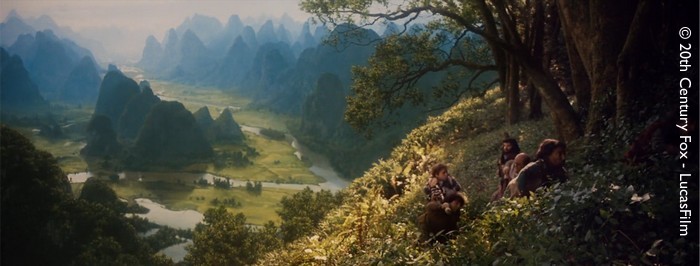
The noise and the wrath
One cannot study the quotes in Willow without speaking about Sergeï Prokoviev's influence on the music for the battles.
In 1984, at the beginning of the cue Stealing the Enterprise (Star Trek III: The Search For Spock), James Horner had already used the flying strings that mark the start of the sword fight between Romeo and Tybalt in Romeo And Juliet (1935). Four years later, it is at the beginning of an action cue of anthology (Escape From The Tavern) that they make a sensational return. The idea is each time the same: to mark the beginning of an opposition with vivacity and virtuosity. The successive returns of such writing through different scores in different times form the cycle raised by James Horner.
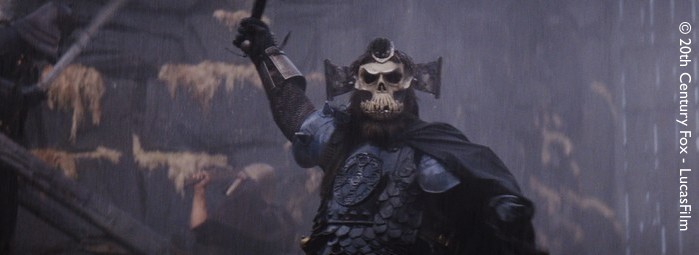
Prokoviev's imprint is also very present in two war motifs taken from his Cantate for the 20th anniversary of the October Revolution. It was particularly used by James Horner in 1988, as it also appears in Red Heat and in The Land Before Time. The piece Revolution is the source of inspiration of the brass motifs announcing the arrival of Kael's troups in the first seconds of Canyon of Mazes and in Tir Asleen (2:07 and 2:25). In the first, Willow and Madmartigan have to quicky hide in the village, not to be caught by the invaders. In the second, the castle where they are is sieged, which compels them to organize a desperate resistance process. In Prokoviev's piece the same motifs bolster choirs singing emergency situations ("here must be no delay, it could ruin everything") and siege situations ("Allocate our forces, move dependable units to strategic points (…) Don't allow the enemy access to the city centre"), the exact same situations lived by the characters of the film. The use of such simple and catchy motifs responds to the dramaturgy conveyed in the movie, while respecting the first idea of their creations at the beginning of the previous century.

Czech, Bulgarian, Norwegian, Russian, German, Hungarian… those are the origins of James Horner's quotes in Willow. He deploys all his knowledge of European music. At the same time, the composer's talent is to also propose a score that perfectly fits the pictures and that extends the musical legacy, through which his writing has developed, because of quotes guaranteeing a progression of harmonies and a respect of the authors' prime meaning. A legacy in music.
"Along with the scenario, the score for Willow appeared to me as a work that must call upon the history of music, the "root" to create the necessary inspiration for the movie. It represents one of my constant claims and, in this specific sense, Willow is to me one of the most relevant balances between concert and cinema."
Sources :
James Horner's words are excerpted from the article JH et des poussières written by Jean-Christophe Arlon and Didier Leprêtre for Dreams Magazine (2002).




